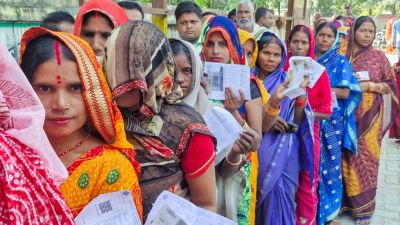Can a judge have political affiliations? Here’s what happens around the world
A retiring High Court judge has declared himself to be a lifelong member of the RSS. Is it common for a judge in India to be politically affiliated? What about judges in the US and the UK?
 “Today, I must unfold my true self... To the distaste of some persons, I must admit here that I was, and I am, a member of the Rashtriya Swayamsevak Sangh (RSS),” Justice Chitta Ranjan Dash, now retired, said in Kolkata. (File)
“Today, I must unfold my true self... To the distaste of some persons, I must admit here that I was, and I am, a member of the Rashtriya Swayamsevak Sangh (RSS),” Justice Chitta Ranjan Dash, now retired, said in Kolkata. (File)A retiring judge of Calcutta High Court said in his farewell speech on Monday (May 20) that he was, and is, a member of the Rashtriya Swayamsevak Sangh (RSS).
“Today, I must unfold my true self… To the distaste of some persons, I must admit here that I was, and I am, a member of the Rashtriya Swayamsevak Sangh (RSS),” Justice Chitta Ranjan Dash, now retired, said in Kolkata.
The RSS claims to be a “cultural” organisation, but it is the ideological parent of the BJP (and earlier, the Bharatiya Jana Sangh), and has always had a clear political agenda. Can judges have political affiliations, in India or elsewhere?
India: Judges appoint judges
“Prior to the 1970s, a judicial candidate’s political ideology was not much of a concern in the judicial appointments process,” advocate and legal scholar Abhinav Chandrachud wrote in his book, ‘Supreme Whispers: Conversations with Judges of the Supreme Court of India 1980-89’ (2018).
This changed after Indira Gandhi’s government suffered setbacks in the Supreme Court in the Golak Nath, bank nationalisation, and privy purses cases, Chandrachud wrote. S Mohan Kumaramangalam, a minister in Indira’s cabinet who was previously advocate general of Madras state, especially “openly advocated the doctrine that the ideology of judges must be considered while determining whether they were fit for appointment to the Supreme Court”.
Chandrachud wrote about the case of Justice M N Chandurkar, a former Chief Justice of the Bombay and Madras High Courts, whose elevation to the Supreme Court was blocked because of his alleged links with the RSS.
“…Chief Justice [Y V] Chandrachud recommended him (Justice Chandurkar) for appointment to the Supreme Court in 1982 and 1985, a few months before his own retirement… The government informed Chandrachud that Chandurkar had attended the funeral of RSS leader M S Golwalkar and had said nice things about Golwalkar in a eulogy… Prime Minister Gandhi told Chandrachud, “my party people think he’s not good”, and…“is not likely to be helpful to us (the government)”.
Since the 1990s, appointments to the Supreme Court and High Courts have been done through the Collegium system, in which judges appoint judges. There is a presumption of neutrality of judges in India today, and they are usually not expected to have any overt political affiliations.
There was controversy in February last year, after lawyer Lekshmana Chandra Victoria Gowri was appointed additional judge of the Madras High Court.
Justice Victoria Gowri had been a national general secretary of the BJP women’s wing, and 21 Madras High Court lawyers wrote to the President and the Supreme Court Collegium objecting to her elevation as a judge. They pointed to alleged hate speech by the judge, saying she had earlier compared Islam to “green horror” and Christianity to “white fear”.
However, there were others, including lawyers, who argued that the BJP was not a banned entity, and that it was the judge’s conduct after elevation that mattered, not opinions that she may have expressed earlier.
Justice Victoria Gowri’s appointment was challenged before the Supreme Court, but a Bench of Justices Sanjiv Khanna and B R Gavai dismissed the petition, saying courts should not get into the question of suitability.
UK: Merit and experience
Unlike in the United States, judges in the United Kingdom are selected by a process that prioritises merit and experience over political affiliation. The system relies on senior members of the judiciary and others who are acquainted with the judiciary to choose judges, whose “selection must be on merit”.
The UK judiciary’s “Guide to Judicial Conduct” states: “Any judicial office holder who is known to hold strong views on topics relevant to a case, by reason of public statements or other expression of opinion, should consider whether it would be appropriate to hear the case irrespective of whether the matter is raised by the parties. The risk will arise if a judicial office holder has taken part publicly in a controversial or political discussion.”
Judges in the UK are expected to avoid any appearance of political ties, e.g., by attending political gatherings, political fundraising events, contributing to political parties, or speaking at political fora. They are also expected to not participate in public demonstrations which would associate them with a political cause, diminish their authority, and cast doubt on their independence.
Judges are prohibited from running for Parliament under the House of Commons (Disqualification) Act, 1975.
US: A highly political judiciary
The American system places judicial appointments in the hands of politicians. The President appoints judges to the higher judiciary, and the appointments are confirmed by the United States Senate in what is most often a partisan vote.
US judges serve for life, and have well known political positions that may be conservative or liberal. A conservative or a liberal majority in the nine-judge Supreme Court often means the outcome of at least some cases can be predicted with a degree of certainty. The appointment of three conservative justices by President Donald Trump has resulted in a 6-3 conservative supermajority in the US Supreme Court.
However, Canon 5C of the American Bar Association Model Code of Judicial Conduct, 1990 prohibits judges from engaging in political activity except “on behalf of measures to improve the law, the legal system or the administration of justice”.
Canon 4 of the 2007 model code provides that a judge “shall not engage in political…activity that is inconsistent with the independence, integrity, or impartiality of the judiciary”. It does not include an express exception for political activity related to the administration of justice.
Singapore: Independence and competence
The Singapore Supreme Court’s Judicial Code of Conduct says that its legal system is founded upon the cardinal principle “that an independent and competent judiciary must interpret and apply the laws of the country and do justice without any fear or favour, affection or ill-will to the best of its ability.”
Also, “judges should conscientiously ensure that the level of their associations with members of the Legislature and/or the Executive, if any, do not give rise to any doubts about their independence or any unintended appearance that the Judiciary may be beholden to others in any way by such associations”.
Judges should not be members of clubs or associations having “any real or ostensible links with any political party”, and should not hear cases where there could be a public perception of their lack of impartiality because of their spouses’ or immediate family member’s political activity or affiliation.
Australia: Keep politics at arm’s length
Australia’s Guide to Judicial Conduct states that “Although active participation in or membership of a political party before appointment would not of itself justify an allegation of judicial bias or an appearance of bias, it is expected that, on appointment, a judge will sever all ties with political parties.”
The document says that giving the appearance of continuing ties by attending political gatherings, political fundraising events, or through contributions to a political party should be avoided.
Publicly-aired opinions indicating a bias can be grounds for disqualification of a judge. “If a judge is known to hold strong views on topics relevant to issues in the case because of public statements or other expressions of opinion, the possible disqualification of the judge may have to be addressed, whether or not the matter is raised by the parties,” the code says.


- 01
- 02
- 03
- 04
- 05



































